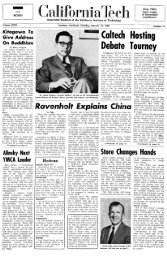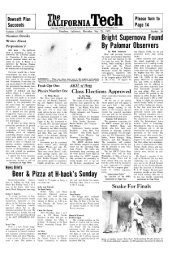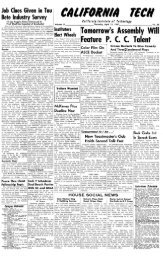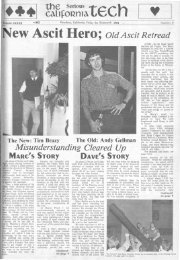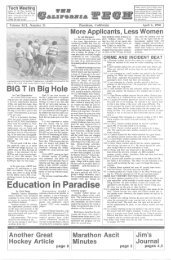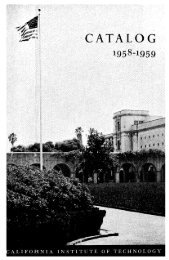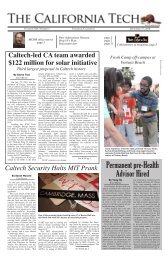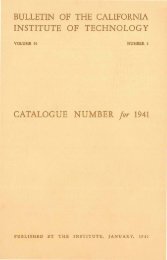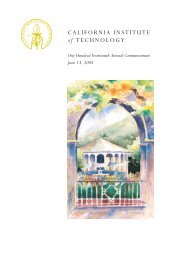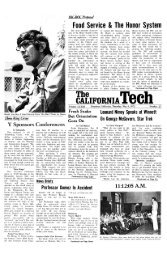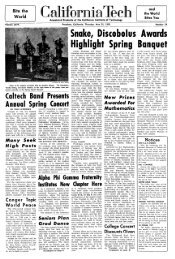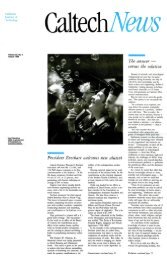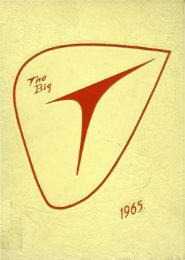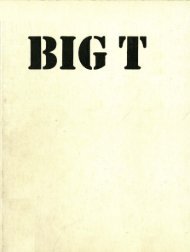CALTECH NEWS - CaltechCampusPubs
CALTECH NEWS - CaltechCampusPubs
CALTECH NEWS - CaltechCampusPubs
Create successful ePaper yourself
Turn your PDF publications into a flip-book with our unique Google optimized e-Paper software.
1 0 iiiiiiiiiiiiiiiiiiiiiiiiiiiiiiiiiiiiiiiiiiiiiiiiiiiiiiiiiiiiiiiiiiiiiiiiiiiiiiiiiiiiiiiiiiiiiiiiiiiiiiii<br />
Extracted from the August 1986<br />
issue of Petroleum Review, the<br />
monthly magazine of the Institute of<br />
Petroleum, London, United Kingdom.<br />
Circumstances have confirmed to<br />
Dr. Pierre Jungels time and again that<br />
his five years at the California Institute<br />
of Technology were among the .<br />
most fortunate in his life. These include<br />
the occasion when a rifle was<br />
shoved in his back by a young soldier<br />
in a fever of excitement in the aftermath<br />
of a battle-in which he was no<br />
participant-and the orderly decisions<br />
of commercial life .<br />
What they did at Caltech was to<br />
show him-convince him foreverthat<br />
nothing is established and that<br />
everything has to be questioned.<br />
The situation when the wild-eyed<br />
Angolan soldier burst into his Petrofina<br />
house might have been, "Is this<br />
the end?" To Pierre the question was:<br />
"How can it possibly be the end?<br />
There may be three rival armies<br />
fighting each other at the same moment<br />
in this town-but the commanders<br />
know me. They all tell us they<br />
want Petrofina here. Ours is the<br />
country's only oil production, and it<br />
is rising. Surely they must continue<br />
to want me here? It is a matter of<br />
making the right contacts. This is<br />
what this soldier- and his friends<br />
who have just joined us-and I must<br />
do."<br />
Pierre was the soldier's prisoner as<br />
they walked through the streets of<br />
the north Angolan town to the headquarters<br />
of the movement which had<br />
won the night battle on this occasion.<br />
Pierre was pleased to see a familiar<br />
face or two when they arrived. There<br />
were handshakes and goodwill expressed<br />
all round. He was soon back<br />
to the Petrofina office, next door to<br />
his house, where the night had been<br />
spent sensibly hugging the floor. The<br />
company was open for business<br />
as usual.<br />
It was 1975, and his role: district<br />
manager for the northern province of<br />
Angola for Petrofina. Although the<br />
country was torn by a civil war, Petrofina<br />
was operating fully. A succession<br />
of interesting circumstances,<br />
several of which had been set in motion<br />
by his questioning of himself and<br />
what he was achieving, had brought<br />
him to Angola at the moment when<br />
the Portuguese were leaVing and<br />
violence erupted as political tensions<br />
escalated. These events went back<br />
only a little more than a decade because<br />
at the time of the prisoner incident<br />
in 1975, Pierre was but 31.<br />
The Caltech perspective:<br />
A life-saving asset?<br />
There having been five generations<br />
of engineers in the Jungels family, it<br />
was not surprising that his father, a<br />
highly successful chemical engineer in<br />
. Liege, wanted Pierre to follow the<br />
tradition. But Pierre wished to be- .<br />
come a veterinary surgeon. His<br />
mother's father had a big farm in the<br />
wheatlands of western Belgium,<br />
where Pierre spent long holidays. He<br />
loved the cattle and horses. When the<br />
vet came, the young Jungels watched<br />
and helped him at work.<br />
The difference of opinions on the<br />
future led to a clash between father<br />
and son when the time came for<br />
Pierre to go to university. The<br />
father's views won. He pointed to the<br />
suddenly difficult outlook for vets in<br />
Belgium. The Belgian Congo was becoming<br />
independent and many veterinary<br />
surgeons were returning<br />
home. There was not enough work<br />
for them all. "They are having to<br />
look after canaries, not cattle," declared<br />
Mr. Jungels senior.<br />
Pierre, who had not been as questioning<br />
as he was later to become, accepted<br />
that fact and said he would<br />
like to attend mining engineering<br />
school in Liege-but with an option<br />
in geology-because that would associate<br />
him with nature, which he<br />
Last summer,<br />
Pierre Jungels<br />
became the<br />
Institute of<br />
Petroleum's<br />
youngest<br />
president. He<br />
credits his<br />
Caltech<br />
education with<br />
convincing him<br />
that nothing is<br />
established and<br />
that everything<br />
has to be<br />
questioned- a<br />
perspective that<br />
helped him when<br />
a wild-eyed<br />
Angolan soldier<br />
shoved a rifle in<br />
his back.<br />
loved, and with his original intention.<br />
This was agreed.<br />
When he graduated with a Belgian<br />
mining engineering degree in 1967,<br />
the oil industry was in one of its periodical<br />
troughs. Geologists were not<br />
being recruited. Coal mines were<br />
closing all over Belgium.<br />
"I decided to take the soft option<br />
of continuing at university," he told<br />
me. "I was lucky to get a Fulbright<br />
Scholarship for further studies in the<br />
United States. Mistakenly thinking it<br />
was a middle-of-the-road engineering<br />
school, I applied for the California<br />
Institute of Technology. It is in fact<br />
one of the top research institutions in<br />
the world, with 23 Nobel Prize winners<br />
among its faculty and alumni.<br />
[Ed. note: There are 20] There were<br />
some 750 undergraduates, 700 studying<br />
for doctorates, and the faculty<br />
numbered 650-the highest ratio of<br />
faculty to students anywhere.<br />
Caltech required a minimum of five<br />
years for a PhD in geophysics or<br />
geology, simply because they feel a<br />
Caltech doctorate must represent a.<br />
significant advance in research. This<br />
research has also to achieve publication,<br />
at least in part, in recognized<br />
journals. It all takes time."<br />
Earthquakes was his study, in the<br />
Richter Laboratory; his thesis being<br />
Tectonic Processes Associated with<br />
Earthquakes. He was awarded his<br />
doctorate in geophysics and hydraulics<br />
in 1973, after 11 years at university.<br />
It happened that in using<br />
one of Cal tech's large computers on<br />
the tectonic process, he produced<br />
models on the Long Beach oilfield<br />
where the sea floor of the harbour,<br />
due to subsidence, had fallen considerably-<br />
but later to rise again following<br />
water injection. This study by<br />
Pierre much interested Shell America<br />
when he began looking for a job. By<br />
the scholarship rules, he had to work<br />
outside the U. S. for at least two<br />
years. Shell International offered him<br />
a job as a petroleum engineer and after<br />
six months' training at The<br />
Hague, he was sent to Borneo as well<br />
site petroleum engineer.<br />
He felt conscious of his age.<br />
He was 29 going on 30. Most of<br />
the people joining Shell with him<br />
then, in 1973, were 21-year-old BAs<br />
or Dutch engineers who were 23 or<br />
24. "And having spent five years<br />
among all these brilliant people at<br />
Cal tech, I probably had begun to believe<br />
I was just as brilliant myself. I<br />
found mud logging and all those<br />
things not particularly satisfactory."<br />
The questioning process was so<br />
severe that after a year he resigned.<br />
"The fact that I resigned before finding<br />
another job showed I had probably<br />
not grown up from university<br />
attitudes, especially as my wifewhom<br />
I'd met and married in California-<br />
was expecting twins."<br />
It was also an illustration to him<br />
that taking the right course is more<br />
important than being deterred by the<br />
risks. He found that the Belgianbased<br />
Petrofina company was looking<br />
for reservoir engineers. Being a<br />
Belgian, having the right sort of degree<br />
and a certain amount of experience,<br />
won him a job as a staff<br />
reservoir engineer in Brussels. He was<br />
put to work on the model of a reservoir<br />
in Portuguese Angola, where the<br />
company had a subsidiary, and next<br />
he was asked to go there to assess<br />
conditions and to amplify the technical<br />
recommendations. It was to be a<br />
short assignment.<br />
But events were dictating the situation<br />
even as he arrived. The outbreaks<br />
of violence as Portugal began<br />
to withdraw from the country led to<br />
the sudden departure of Portuguese<br />
staff. Pierre was given a promotion<br />
that startled him. He was asked to<br />
stay as district manager of the<br />
northern province which held most<br />
of Petrofina's oil production. He remained<br />
in that post for two years,



